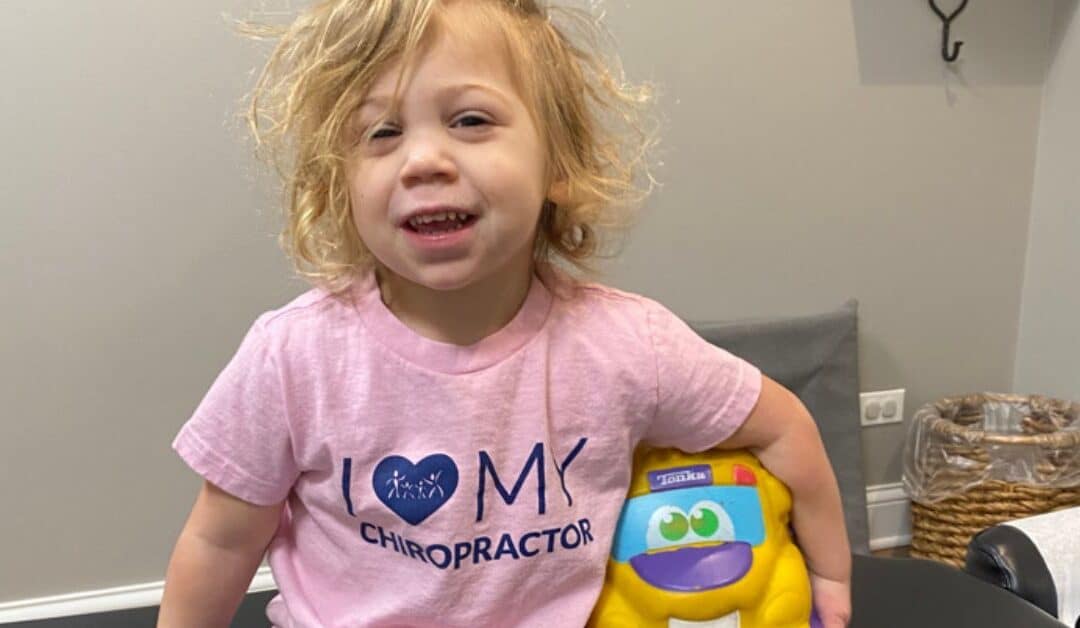All parents of children with autism have likely been told that only autism medication and other psychiatric drugs can “fix” their child’s issues. But whether your child struggles with anxiety, aggressive outbursts, or focus deficits, there’s one major thing that autism medication will never provide—relief from the root cause.
A recent study revealed that 8% of children with autism were prescribed medication to treat behavior symptoms, and almost half of them were under the age of 3 when the medication first started. While medication can provide short-term symptom relief, this article aims to reveal the problems of medicating these distress signals without first addressing their origins.
We’ll also explore the delicate interplay of nervous system dysfunction, subluxation, impaired vagus nerve function, chronic inflammation, and other systemic imbalances as they relate to Autism Spectrum Disorder (ASD) and other mental health conditions.
Most importantly, you’ll learn why medication fails and how personalized, Neurologically-Focused Chiropractic Care options can provide much-needed relief for children with autism.
What Is Autism?
Autism Spectrum Disorder is a complex developmental condition involving challenges with social communication/interaction and restricted/repetitive behaviors. It affects information processing and sensory perception in the brain and body.
Those with autism excel in diverse areas and have unique strengths/perspectives. But many also face physical health issues, sensory sensitivities, and bio-behavioral struggles emerging from systemic imbalance. Understanding this context prevents reducing a child to just a diagnosis.
It’s important to look at autism as not just a brain-based disorder, but instead as a whole body or “multi-system” disorder where the stress and dysfunction first begins in the body and brainstem regions, and then “ends up” in the brain.
Understanding the brain-body and body-brain connection and communication loop is essential to understanding the real root causes of autism, and therefore being able to provide drug-free care that addresses those core neurophysiological dysfunctions.
Is There Medication for Autism?
There are no medications for autism, specifically. However, the FDA has approved two antipsychotics to help relieve the condition’s associated problems. Risperidone (Risperdal) and aripiprazole (Abilify) are prescribed to children as young as five to curb aggressive and self-harming impulses potentially.
However, autism advocacy groups like the Autism Self-Advocacy Network question this premise of “chemical restraints” prioritizing external control over internal healing.
Beyond FDA-approved options, doctors frequently prescribe off-label psychiatric meds like antidepressants, stimulants, and anti-anxiety drugs, often laden with undesirable side effects. However, as recent research shows, these medications may not only produce undesirable side effects but are barely even effective for most children with autism.
Additionally, all psychotropics carry side effect risks like weight gain, hormonal disruption, personality dulling, and even permanent neurological changes. Despite minimal benefits and safety concerns, a recent study showed that 8.1% of children studied do use psychotropic medications to manage their behavioral challenges.
Parents may feel tempted to try stimulant medications like Adderall for autism, hoping it may relieve some behavioral and attentional difficulties. However, autism requires a vastly different approach than ADHD due to more complex sensory, neurological, inflammatory, and metabolic factors at play.
Stimulants can further dysregulate the nervous system, exacerbate anxiety and OCD tendencies, and impair sleep critical for development. While problems may be temporarily masked on the surface, the crash later proves too difficult for many children with autism.
Additionally, the long-term risks of addiction and cardiac issues pose too great a gamble, especially when safer interventions addressing root causes exist but remain overlooked. Given the expansive scientific insights into autism’s biological underpinnings, supporting nervous system resilience without stimulants provides the most prudent path ahead for families.
What Leads Families to Seek Medication for Autism Treatment?
When children with autism experience unrelenting meltdowns, aggression, extreme sensory overloads, or mental health challenges, parents can feel desperate for relief. Facing crushing judgment about their parenting on top of unbearable uncertainty and stress can take an exhaustive toll.
In these moments of desperation, antipsychotic drugs may appear to be the only solution for restoring basic safety and stability, particularly as pediatricians often minimize their associated risks.
However, emerging research implicates immune dysregulation, GI inflammation, mitochondrial dysfunction, oxidative stress, and nervous system coordination deficits as primary triggers of autism’s behavioral expressions. Genetics plays a role for some, but we now know that environmental triggers often provide the early and significant disruptions to this development.
The Problem With Viewing Autism as Merely Genetic
Mainstream medicine suggests that autism is a genetically determined, incurable psychiatric disorder that requires lifelong supervision, therapy, and medication to manage symptoms. But this perspective is woefully incomplete for families determined to help their children reach their highest potential.
The predominant psychiatric narrative focuses strictly on the central nervous system itself as the primary driver. However, emerging science reveals autism spectrum disorder as a whole-body condition involving imbalance of the autonomic nervous system (dysautonomia), as well as the enteric nervous system of the gastrointestinal tract, immune-inflammatory imbalance, metabolic dysfunction, microbiome disruption, and faulty connectivity between the brain, gut, and body.
Appreciating autism systemically also grounds it in a cascade of environmental triggers disrupting development, not just genetically predetermined probabilities. Factors like prenatal stress, birth complications or birth trauma, and early exposure to toxins and medications provide sequential hits. This “Perfect Storm” of factors then alters neurological wiring and function in ways requiring comprehensive care.
The Limitations of Applied Behavior Analysis As Autism Treatment
Applied Behavior Analysis (ABA) aims to shape autistic behaviors using a structured system of rewards and consequences. ABA advocates believe that by breaking down skills into discrete steps taught via repetition, they’re assisting children with autism in obtaining independence.
Foundationally ABA therapy accepts the premise that the internal “misfirings” associated with autism are genetic and pre-programmed, so the only way to help improve quality of life is to use these repetitive trainings to externally “redirect” things. In contrast, our PX Docs neurologically-focused approach works from the “inside-out” improving those internal brain-to-body and body-to-brain connections and signaling.
The Nervous System’s Central Role
While nutrition, functional medicine, various therapies, and behavioral approaches all provide value, sustainable change requires addressing nervous system dysfunction first. Since the nervous system is the master coordinator of all biological functions, optimizing it should be the number one priority.
This is where advanced Neurologically-Focused Chiropractic Care proves invaluable. Our PX Docs network of Pediatric Chiropractors leverages customized protocols using technology to measure and address subluxation and dysautonomia.
Subluxation, or neurological dysfunction or dysregulation patterns, interfere with the neural pathways between the brain and body. Dysautonomia is the resulting chronic imbalance between the sympathetic fight-or-flight and parasympathetic rest-and-digest nervous system branches.
Fortunately, through specialized, neurologically-focused adjustments, subluxations can be corrected, interference reduced, and the vagus nerve stimulated to improve function across cognitive, digestive, and immune pathways. Instead of overriding distress signals via medication, these adjustments restore internal coordination and alignment naturally.
Looking Beyond Pharmaceuticals to Empower Families
When it comes to autism medication, parents and caregivers should consider several key points:
- Families feeling overwhelmed by severe challenges deserve empathy, not judgment, for desperately seeking solutions, even those with risks
- Labeling distress as “bad behavior” reframes normal distress reactions as defects that require often unnecessary pharmaceutical restraint
- The conventional view of autism as a genetic condition ignores extensive science on the interconnectedness of the vagus nerve, gut, immune system, metabolism, microbiome, and nervous system dysregulation
- Innovations like Neurologically-Focused Chiropractic Care can restore nervous system balance and improve quality of life without dangerous, potentially permanent psychotropics
- Progress involves supporting children compassionately exactly where they are and not demanding conformity
To create change, parents and professionals must shift the autism conversation toward more empowering paradigms that address root causes. Appreciating each child’s complex neurophysiology should remain the compassionate foundation guiding families toward their highest potential.
Resources from PX Docs empower families to explore solutions beyond behavioral medication approaches, aiming to address the underlying factors that hinder development. By spotlighting Neurologically-Focused Chiropractic Care from specialized providers, parents can help rebalance their child’s nervous system, address subluxation, stimulate the vagus nerve, and restore healthy communication within and between critical systems.
Help children with autism reach their highest potential with safe, effective, drug-free support. PX Docs offers a refreshed perspective, reminding families and providers alike to see each unique child with compassion and possibility. Visit our PX Docs Directory to find a trained PX Doc near you today.





